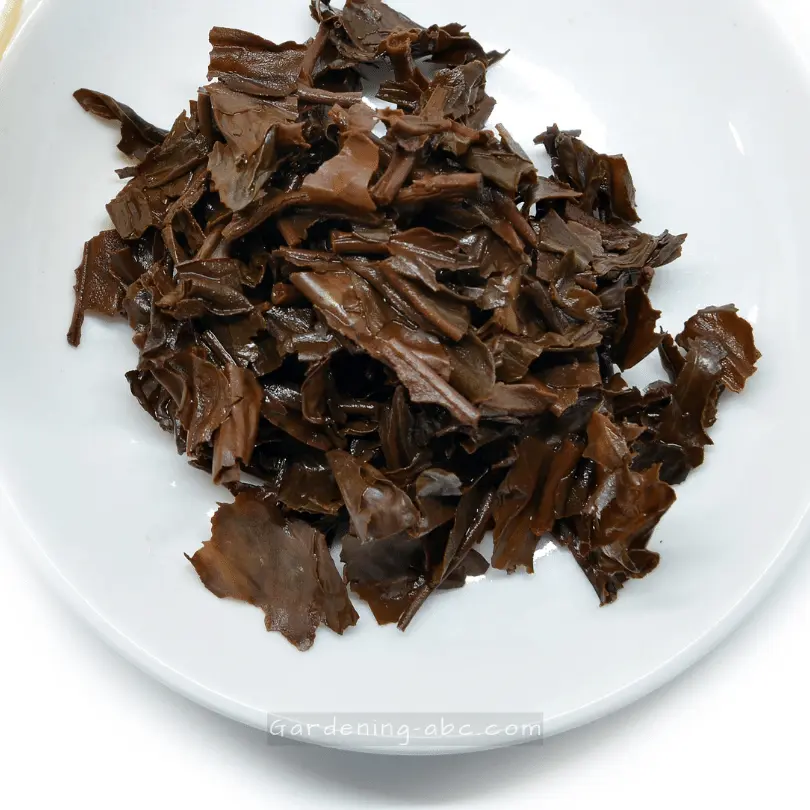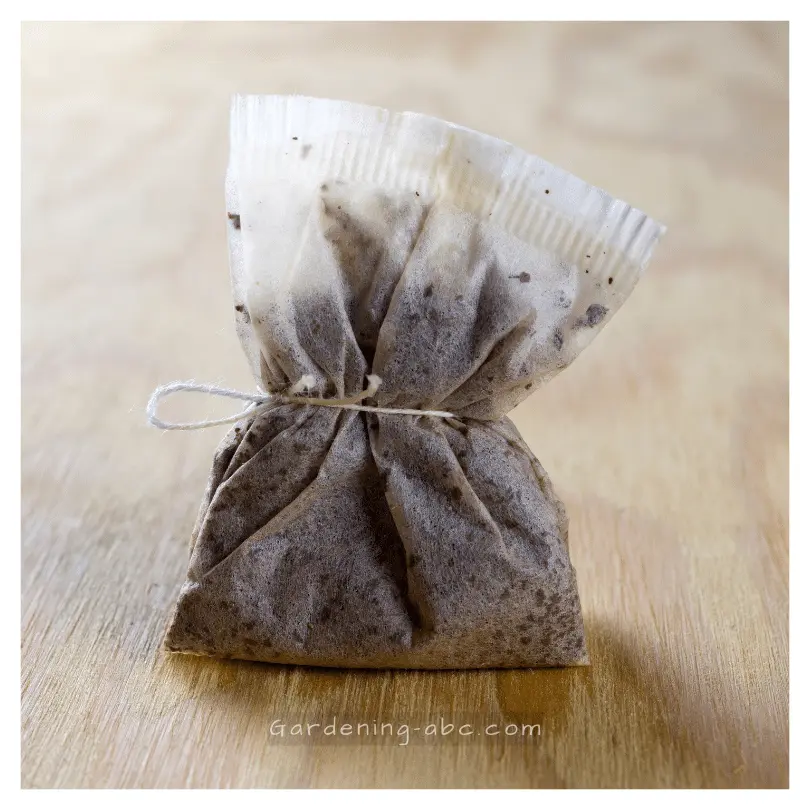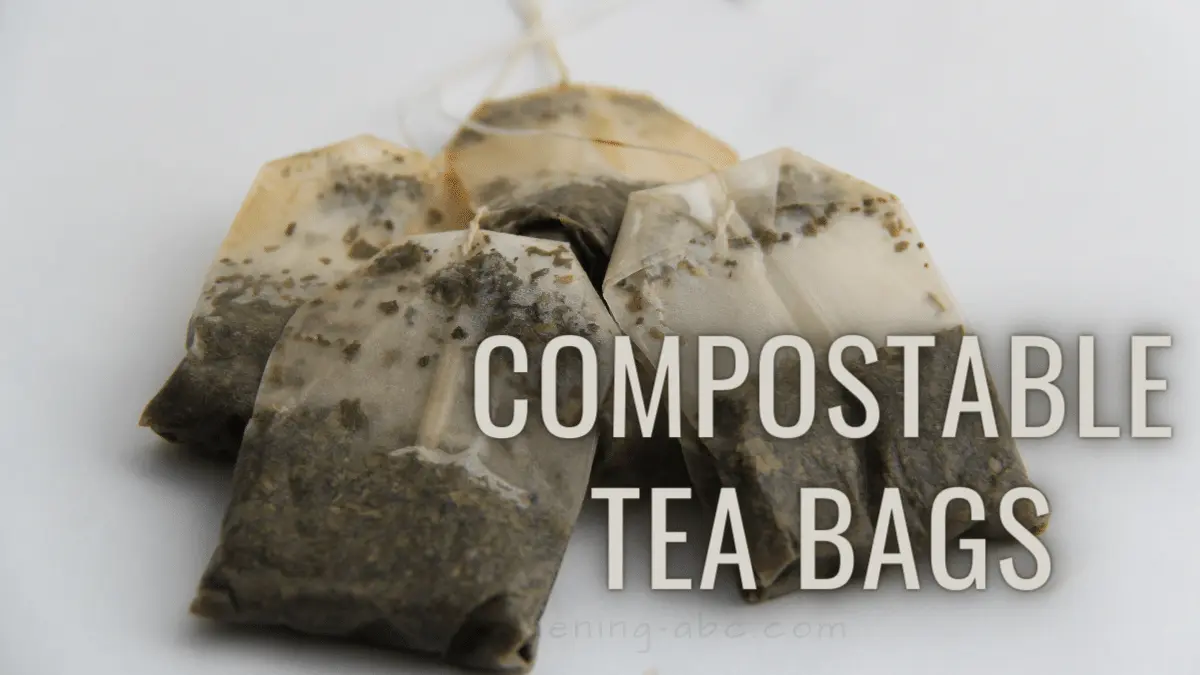We use affiliate links to run our site. When you buy through links on our site, we may earn an affiliate commission, without any added cost to you. Learn more
Tea is one of the most widely consumed beverages in the world. The comforting ritual of brewing a hot cup of tea is a daily tradition for many. Tea bags provide a quick and easy way to steep loose tea leaves. But when it comes time to compost the used tea bags, many gardeners wonder – can you compost tea bags?
On the surface, it would seem that tea bags should be compostable. After all, they contain natural materials like paper and dried tea leaves. However, modern tea bags often include other less compost-friendly materials too. So the answer is more nuanced than you might think.
In this article, we’ll take a closer look at the complex issue of composting tea bags.
Table of Contents
The Problem With Tea Bag Materials
Back in the day, tea bags were simple – just paper and tea leaves. Those basic bags could be tossed straight into the compost without any issue. But today, things aren’t so straightforward.
Over time, companies started getting creative with tea bag materials. They added in all sorts of mixes like:
- Nylon or other plastics to make the bags stronger
- PLA and other plant-based plastics that supposedly biodegrade under industrial conditions
- PVC plastic to seal up the bags
- Polypropylene plastic to shape the bags uniformly
- Silky fibers give a luxurious feel and texture
The problem is, any plastic added makes the bags pretty much useless for backyard composting. Even compostable plastic needs high heat to break down, so it just sits there in your home compost pile. Not good!
Synthetic-feel bags made with nylon or PET fibers won’t compost well either. Oh, and metal staples are bad news too.
So unless you know for 100% sure your tea bags are plain paper, it’s safest to assume they have some non-compostable stuff in there. That means most tea bags shouldn’t just get dumped into your compost bin as-is these days. Bummer, I know!
Compost Tea Leaves

While the tea bag itself might be problematic, the used tea leaves inside can still provide valuable nutrients and organic material to your compost.
As they break down, leaves from teas like black tea, green tea, and herbal tea will:
- Add nitrogen: Tea leaves contain approximately 3.5% nitrogen, a key nutrient for your compost.
- Provide carbon: Dry leaves are a source of brown carbon-rich matter.
- Improve soil structure: The organic material in tea leaves helps create richer, healthier soil.
- Retain moisture: Tea leaves increase the water-holding capacity of your compost when mixed in.
- Encourage helpful decomposers: Microorganisms will break down tea leaves as they work through your compost.
So rather than throwing used tea bags in the trash, it’s best to open them up and empty the tea leaves into your compost bin. This allows you to make the most of the nutrients.
Are Tea Leaves and Tea Bags Good for The Plants?
Is My Tea Bag Compostable?
The easiest way to identify if a tea bag is compost-safe is to take a look inside before steeping your tea. Carefully open the bag and inspect the contents.
Look for these signs of compostability in your tea bags:
- Make sure it’s just paper and leaves in there, no weird textures or fibers. Oh, and watch for any metal staples too – you’ll want to fish those out.
- If there’s a mesh bag or sachet, feel it between your fingers. It should be natural materials only, like cotton, silk, or hemp. Avoid anything with a plasticky feel.
- Check that the leaves are whole and intact, not broken up into dust or powder. That often means lower-grade tea.
- Claims of “certified compostable” on the label are great, just make sure it’s from a legit source before fully trusting it.
- Steer clear of petroleum-derived tea bags with a slippery, silky texture. Those are no good.
After you brew up your cup, inspect the used tea bag again. Properly compostable paper should simply darken when wet, not get a glossy plastic coating.
If anything seems amiss – weird materials, plastic-y textures, etc – keep that bag out of the compost or empty the leaves first.
Doing a quick tea bag inspection takes no time at all and will tell you if they’re compost-safe. It’s a simple habit that makes all the difference!
Is your Favorite Tea Bags Compostable?
Here are some of the most popular tea brands among tea lovers.
| Brand | Is it Compostable? | Remark |
|---|---|---|
| Bigelow | Yes | All Bigelow tea bags are 100% biodegradable. The paper filter bags are bleach-free and dioxin free. The paper sources used for the bags are also 100% sustainable. |
| Celestial | Yes | A survey suggests that Celestial tea bags are “biodegradable & compostable.” However, the exact material used is unclear. They package their teas in natural fiber, pillow-style tea bags that don’t need a string, tag, staple, or individual wrapper. |
| Good Earth | Yes | Good Earth tea bags use bio-plastics (PLA) for their teabags. They can be put in your curbside composting bin, but not composted at home. |
| Harney and Sons | Not 100% Plastic-Free | They are making efforts to progress towards more eco-friendly packaging solutions. |
| Lipton | Likely Compostable | Some articles suggest that Lipton tea bags are indeed plastic-free and compostable, but their compostability may vary. |
| Luzianne | Yes | The Luzianne brand states that “You can compost Luzianne tea bags!” The exact material used is not clear. It’s recommended to check the package or contact the company for confirmation. |
| Mighty Leaf | Yes | The Numi brand says that their tea bags are “commercially compostable.” The sachet is partly made from paper and is lined with a sugarcane-based PLA. It’s best to compost them using a municipal service. |
| Numi | Yes | They are “confident that their teabags are 100% compostable” and can be put in a recycling bin or home composter. The tea envelope includes a very thin coating of plastic, about 1% of the overall packaging. |
| Pukka | Yes | Pukka teabags are 100% compostable and can be put in a recycling bin or home composter. The tea envelope also includes a very thin coating of plastic, about 1% of the overall packaging. |
| PG Tips | Yes | PG Tips tea bags are made of “manila fiber” from the Abacá plant, a type of natural cellulose, making them compostable. They can be put in your curbside composting bin or at home if you have a composter. |
| Republic of Tea | Yes | This brand of tea bags is glue-free and uses unbleached filter paper. They also don’t use string or staples. They do not contain plastic and can be home composted. |
| Stash | Yes | The Stash website says their tea bags are “made from 100% wood cellulose fibers” and do not contain microplastics. |
| Tetley | Moving Towards Biodegradable | The company has made a move towards more biodegradable bags, but their new biodegradable bags are now beginning to enter the market. |
| Tazo | No | Tazo hemp filter bags, including the string and tag, are “not biodegradable or compostable.” They should not be added to a compost pile. |
| Twinings | No | Twinings tea bags recently started using plant-based plastic (PLA), which is only biodegradable through industrial composting services. They should not be composted in a home composter. |
| Trader Joe’s | Unclear | Communication from Trader Joe’s is unclear on this subject. Recent announcements suggest they are moving towards using bio-plastics like many other brands. |
| Yorkshire | Not Plastic-Free | Yorkshire tea bags are not plastic-free, so they should be avoided in home compost bins. The company has stated they are moving towards more ecological materials, including PLA, but they should be composted through curbside composting services. |
| Yogi | Yes | According to Yogi, their teabags are 100% compostable. |
Tips for Composting Tea Bag Leaves
Once you’ve inspected and opened your tea bags, removing any staples, it’s easy to compost the leaves. Here are some tips:
First things first, give those damp tea leaves a chance to fully air dry before mixing them into your compost. Piling wet leaves directly into the bin can cause them to clump up or get moldy. Spread them out on a baking sheet for a day or two until crispy and dry.
When adding the dried leaves, make sure to mix them throughout the entire compost pile rather than dumping them all in one area. Tea leaves are rich in nitrogen, so overloading any one section can throw off your carbon-nitrogen balance. Sprinkle leaves lightly as you build layers.
To help the leaves break down quickly, crush any lump up into smaller pieces before adding them in. You can use your hands to crumble them, or put them in a bag and gently smash with a mallet. The more surface area for compost microbes to munch on, the faster the leaves will decompose.
It’s also best to mix dry tea leaves with browns like dead leaves, sawdust, or shredded paper. Pairing the greens with carbon-rich browns will improve aeration and balance out the nitrogen. Never add just a thick layer of tea leaves by themselves.
Keep an eye out for any unpleasant odors, as that can signal excess nitrogen and anaerobic conditions. If you notice a rotten egg smell, make sure to turn the pile and incorporate additional browns to get more airflow.
Chopping up any large, intact tea leaves can also help speed up the composting process. The smaller the pieces, the quicker they’ll break down.
More Compostable Options:

If you want the ease and portability of tea bags without waste, more sustainable options are available. Seek out these compost-friendly tea bag alternatives:
Compostable tea bags: Brands like Teatulia and Pukka offer bags made from paper, cornstarch, or other compostable materials. Look for certified products.
Loose-leaf tea: Skip the bags entirely and use infusers to brew loose tea leaves. Then compost or garden mulch the leaves.
Disposable mesh tea bags: Unbleached cotton or hemp sachets allow water flow while containing loose leaves for steeping.
No matter which option you choose, always take a moment to see if the packaging is compost-friendly. This will help you reduce waste from your favorite tea ritual.
Composting Partially Used Tea Bags
Sometimes you might not finish an entire cup or pot of tea. This leaves you with partly brewed tea bags. Can you still compost tea bags that have only been used once?
The answer is yes, as long as you open them. Dump out any wet leaves, letting them dry fully on an absorbent towel before composting. Otherwise, moisture can cause the leaves and paper to mold before breaking down.
If a bag is completely dry inside, you may be able to compost it directly, depending on the materials. But you’ll get the most value from the nutrients in the leaves by emptying out the contents first.
Troubleshooting Tea Bag Compost Problems
So you started composting your tea bags, but noticed a few issues popping up? Don’t sweat it, composting can take some getting used to. Here’s how to troubleshoot some common tea bag compost problems:
If your pile starts stinking, it’s probably from anaerobic tea leaves that haven’t gotten enough airflow. No biggie, just mix in some browns like dried leaves or sawdust to aerate the pile. That should clear up the smell.
Finding it’s all breaking down too slowly? Try opening up the bags fully and shredding the leaves into smaller pieces first. That’ll help the compost critters munch through it faster.
Seeing little plastic bits from the bags? Ugh, so annoying. Your best bet is to stick to paper tea bags only in your compost. Or just sift out any plastic pieces you spot during turnings.
Got some clumpy wet tea leaf blobs? I feel you, wet tea bags can totally matt together. The fix is letting your used bags dry fully before tossing them in the compost.
If you’re noticing pests flocking to your compost, it’s likely from combining the tea bags with food scraps. Keep the two separate to avoid luring in any unwanted creatures.
Tweaking your methods based on what issues come up will get your tea bag compost back on track. Play around with moisture, break up materials, remove plastic, and mix it up for ideal composting. It can take some trial and error, but you’ve so got this!
The Future of Compostable Tea Bags
Have you noticed how many tea brands are now advertising their bags as “100% compostable”? With more people caring about sustainability these days, companies are feeling pressured to make their products greener.
Major tea companies like Lipton have promised to switch all their bags to compostable plant materials over the next couple of years.
The good news is, there are already great options out there made of hemp, cornstarch, and other compost-friendly materials. Hopefully, it won’t be long before we can just toss any tea bag in the compost bin without worrying about what’s inside.
For now, though, take an extra minute to open up those tea bags and empty out the leaves before composting. The bags themselves might contain plastics or other stuff you don’t want in your compost.
I know it’s tempting to just throw the whole thing in the bin and be done with it. But a little extra effort now means healthier soil down the road.
Composting used tea bags takes no more than a few extra seconds. Just give them a quick check and empty out the leaves. It’s a simple way to keep harmful materials out of the compost and reduce waste.
With more sustainable options hitting store shelves all the time, someday we’ll be able to compost every tea bag. In the meantime, be mindful of what’s in your tea bags and handle them responsibly. It’s a small change that makes a real difference!
Frequently Asked Questions (FAQs):
Can you Compost Tea Bags with Coffee Grounds?
Yes, you can compost tea bags with coffee grounds. Make sure they are biodegradable and add them to your compost pile along with the coffee grounds.
Can you use Tea Bags as fertilizers?
Yes, you can use composted tea bags as fertilizer for your plants. Ensure the tea bags are made of biodegradable materials, compost them, and create compost tea to fertilize your plants.
Can you compost silk tea bags?
No, silk tea bags are not compostable. Avoid putting them in your compost pile as they won’t break down in a typical composting environment.
Amazon and the Amazon logo are trademarks of Amazon.com, Inc, or its affiliates.

Hi there! My name is Prasenjit and I’m an avid gardener and someone who has grown a passion for growing plants. From my hands-on experience, I have learned what works and what doesn’t. Here I share everything I have learned.
